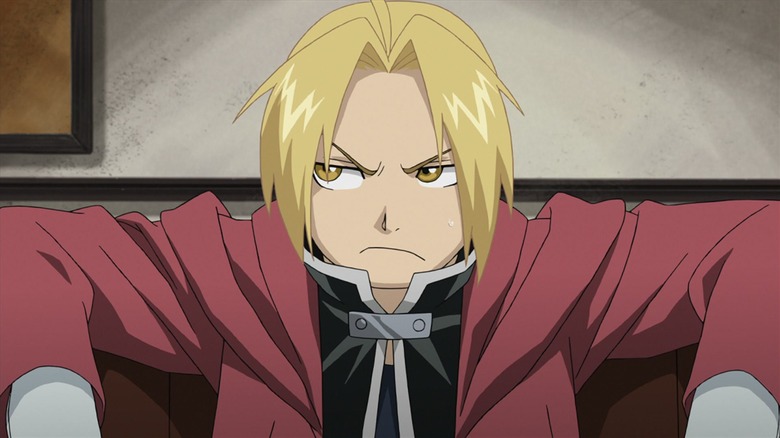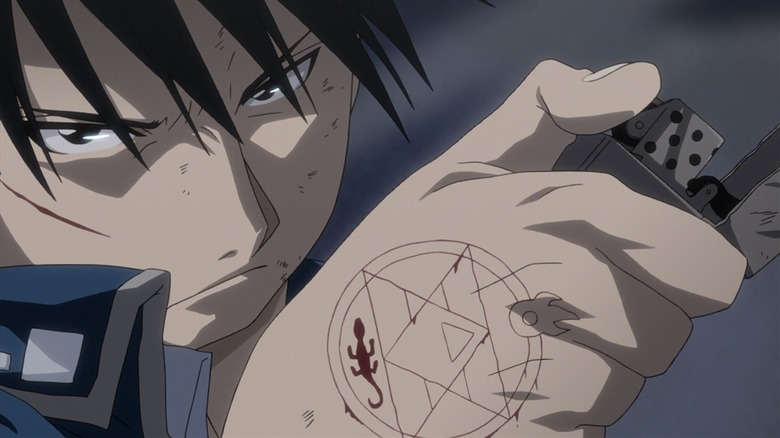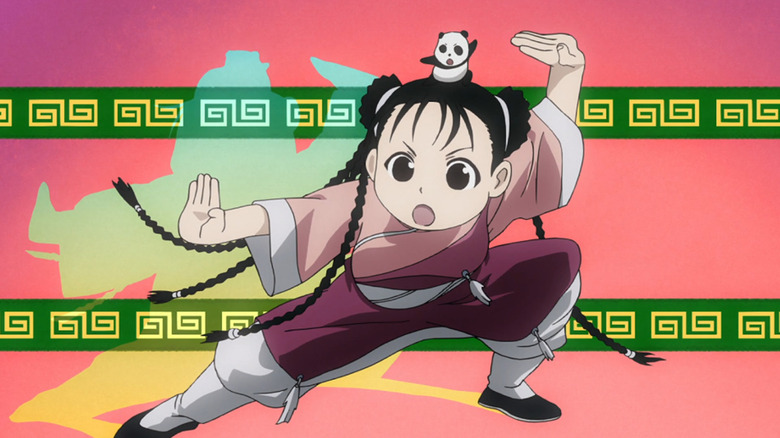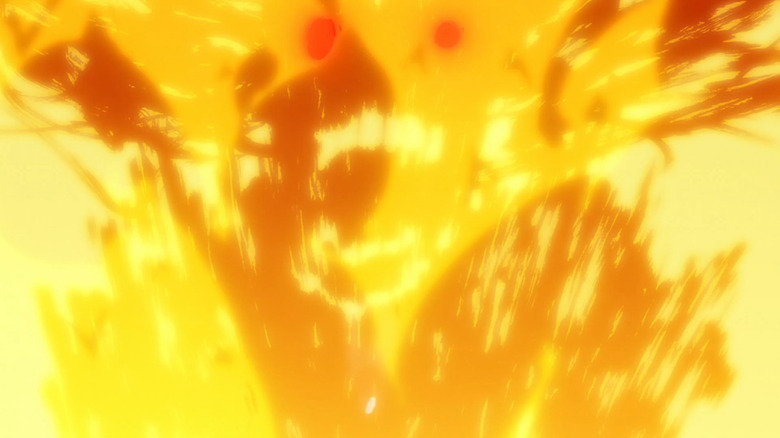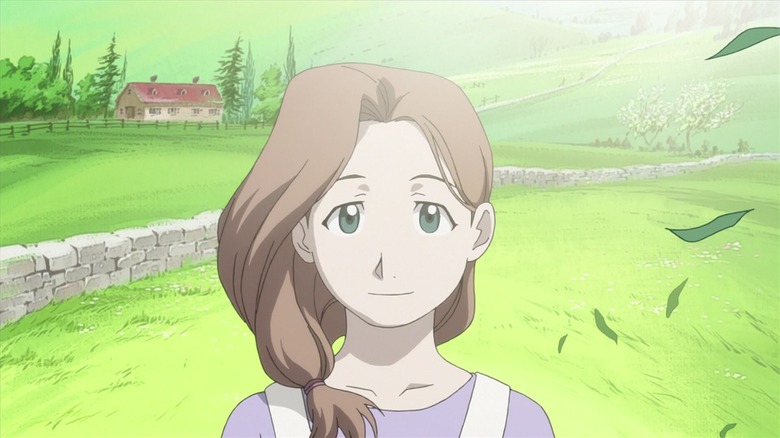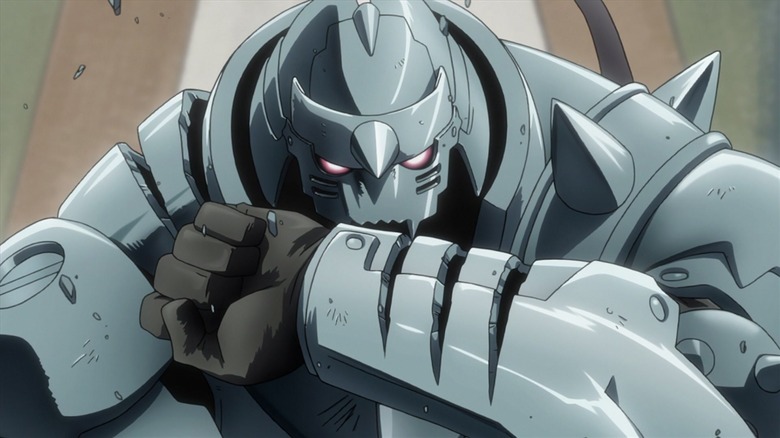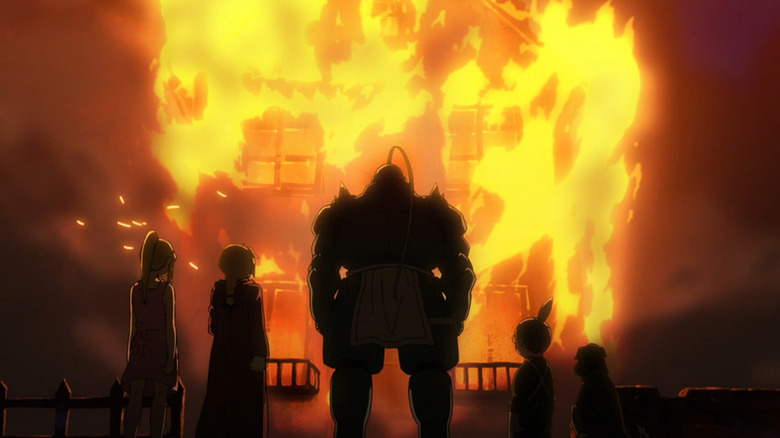Why The Two Fullmetal Alchemist Series Are So Drastically Different
"Fullmetal Alchemist" is the tale of Edward and Alphonse Elric, two broken teenage brothers who go on a quest to find the Philosopher's Stone, a mythical substance with the power to restore their bodies. En route, they clash with villainous, immortal beings called "homunculi" and discover the truth behind their home country of Amestris. It's a heady mix of found families, magic duels and B-movie horror, and just slightly more complex in tone and subject matter than boy's manga standards like "Naruto" and "Bleach."
Beginning with an ongoing manga series that went on to win the prestigious Seiun award in 2011, the story truly exploded after it was adapted to anime form. It was a huge success in both Japan and the United States, winning both popular and critical acclaim. Pokémon introduced me to the world of anime and manga, but it was Fullmetal Alchemist that made me seek it out on purpose.
But just like there are two Elric brothers, there are also two "Fullmetal Alchemist" anime adaptations. "Fullmetal Alchemist" aired in 2003, and it's the one I grew up with. It includes several story elements and characters from the source comic, but it fully diverges at the halfway point. "Fullmetal Alchemist: Brotherhood," on the other hand, aired from 2009 to 2010 and adapted the manga from beginning to end with a minimum of deviations. To this day, fans continue to fight over which series is better. The debate has become as infamous as old standbys like subs versus dubs, or whether anime was really better 10 or 20 or even 30 years ago. By this point, any fan who hears the argument rev up knows it's time to peace out. But why has this argument has gone on for so long? What is it about "Fullmetal Alchemist" and "Brotherhood" that led to this bitter sectarian fight?
You've got a strong pair of legs
Both "Fullmetal Alchemist" anime series were produced by Bones, one of the most consistent anime studios in the industry. Its famous producer Masahiko Minami says in an interview with MangaUK that it was Yoshiyuki Ito, a long-time animator and character designer affiliated with the studio, who discovered the manga on the shelves. Ito recommended the series to Minami, who decided after reading it that Bones should produce it. Since the manga series had just begun, and artist Hiromu Arakawa was still fleshing out the characters and the story, a direct adaptation was impossible. Therefore, the anime staff chose to take the characters and setting in their own direction. Director Seiji Mizushima (immortalized in the excellent workplace comedy "Shirobako" as Seiichi Kinoshita) noted in an interview at Anime Expo 2009, "When I started the project, there wasn't pressure to be faithful to the original story. It was more about creating an original story that would last a full season."
As Mizushima says, one challenge facing the staff of "Fullmetal Alchemist" was how to stretch a manga series early in its serialization to 50 full episodes of anime airing over the course of a year. Their solution was to heavily decompress the source comic, and use original material to fill in the gaps. The first 25 episodes, half of the series, cover just four volumes of story from the manga. The second half deviates fully from Arakawa's original, featuring characters and concepts crafted by the anime staff. Many of the most beloved aspects of "Fullmetal Alchemist" stem directly from these changes. For instance, the lovable family man Maes Hughes dies a tragic death at the hands of the villains in volume 4 of the manga, signaling to the reader that they mean business. But the version of Hughes in "Fullmetal Alchemist" lives until the 25th episode, halfway through the series. Rather than just another twist in the narrative, the death of Hughes becomes the dramatic turning point of "Fullmetal Alchemist." His death in the manga made an impact on me, but I would reckon that it was really his death in the "Fullmetal Alchemist" anime that achieved legendary status in the fan community.
Something of equal value must be lost
On the other hand, there are aspects of "Fullmetal Alchemist" that even its die-hard fans have a hard time defending. Later episodes provide a cyborg man with a gun in its mouth, several oriignal homunculi, and a climactic twist involving an alternate dimension Nazi Germany. Other scenes are more a question of taste: In a famous original sequence, it is revealed a young character introduced early in the series was since sexually assaulted and traumatized by soldiers, and they're raising the child conceived after that act on their own.
It wasn't just that these aspects were controversial, but they were incompatible with the canon and broader tone of the manga. So it is no surprise that years after the release of "Fullmetal Alchemist," Bones decided to produce a new adaptation that would follow the manga to the letter. "That was...the Bible for the whole thing," says Yasuhiro Irie, the director of "Brotherhood," in an interview with Anime News Network. "The whole process was about figuring out how best to convert the manga into anime."
At a glance, a new "Fullmetal Alchemist" series that would fully adapt the manga's story seems like an easy commercial calculation to make. But I want to take a moment to emphasize how ambitious this production was, and how it, in some ways, remains unparalleled. Not only is "Brotherhood" even longer than "Fullmetal Alchemist," not only did it run in parallel with the manga and end at roughly the same time, but it kept a high baseline of visual quality throughout. Anime adapted from boy's comics would have highlights on occasion, and some reached peaks of excellence ranging for dozens of episodes. But a series faithfully adapting a visually ambitious action comic from beginning to end, without major compromises, padding or breaks, was rare. Even today, popular boy's action anime like "My Hero Academia" are aired in chunks of 12 to 24 episodes at a time, and, frankly, don't look as consistently good as "Brotherhood" did.
The results speak for themselves. "Brotherhood" currently has the highest score on My Anime List, a popular anime ranking site where many young fans congregate. "Fullmetal Alchemist" by comparison is ranked #413 on the list.
Even when our eyes are closed
Fans of "Fullmetal Alchemist" insist that while "Brotherhood" is certainly more faithful to the original manga, the direction and storytelling lack a certain spark compared to its predecessor. I have some sympathy for this perspective. Personally speaking, I'm exhausted by the dogmatic faithfulness of modern anime adaptations, which stick to the page while ignoring how best to adapt for the screen. The fact that Mizushima and his collaborators made risky choices in adapting the early volumes of the manga is a decision I respect. At the same time, I think that in its best moments "Brotherhood" is far more than just a page-to-screen adaptation.
One of the strongest weapons in the show's arsenal is the animator Yoshimichi Kameda, a fan-favorite action animator who came into his own while working on "Brotherhood." His breakthrough scene immortalizes a battle from the manga's 10th volume, where the tortured captain Roy Mustang defeats the cruel homunculus Lust by roasting her to a crisp with alchemy. The scene was already striking in the manga, but under Kameda's hand it transforms into something even greater. Lust explodes into a rictus of thick black lines and shocking "impact frames," her face contorted in horrible pain and anger.
Kameda comes back again and again to animate some of the manga's best scenes. He knocks it out of the park every single time. Anime fan writer purplegeth wrote that "it almost feels like Hiromu Arakawa drew her manga panels with the express purpose of having ... Kameda later bring them to life." Of course, Kameda was just one of many talented animators working on "Brotherhood." But I use his example to prove a point, which is that "Brotherhood" is not simply impressive because it looks "modern" compared to "Fullmetal Alchemist." Rather, "Brotherhood" is impressive because, while the story is a beat by beat adaptation of the manga, its best sequences take full advantage of the medium of anime. I believe that the choices made by Kameda and co. in these setpieces show, at the very least, as much care as any interpretive choice made by the team on the original adaptation of "Fullmetal Alchemist" in 2003.
That's what makes it so beautiful
When the case is laid out that way, it seems cut and dry that "Brotherhood" is superior to "Fullmetal Alchemist." But I don't agree. While I believe that the manga is the definitive version of the story (and "Brotherhood," by that metric, the "definitive" anime) there are aspects of "Fullmetal Alchemist" I love that are nowhere to be found in "Brotherhood."
In my book, the strongest of those elements is the soundtrack. The music of "Fullmetal Alchemist" is composed by Michiru Oshima, whose work spans across both anime and live-action. Its most famous song is "Bratja," a song with Russian lyrics infamous for reducing anime fans of a certain age to tears. Translated into English, the first stanza of the song expresses the feelings of the older brother Edward Elric:
"Forgive me, little brother
I am so sorry before you.
It's forbidden to try to return
One taken by the earth."
Later, we see the words of the younger brother, Alphonse Elric:
"I cannot blame you,
I am not hurt at all.
Well, we sinned
By wanting to be stronger than everyone else."
We're tiny insignificant humans
In these two stanzas is the full weight of "Fullmetal Alchemist" as a story. Edward struggles to bear the sin by which he obliterated his brother's body and violated his mother's. But Alphonse is mature enough to realize that while Edward beckoned Alphonse to walk upon the path, Alphonse alone made the decision to take the first step. In a piece for Anime News Network defending the 2003 adaptation, Rose Bridges says, "'Bratja' is a sad song, but I think the reason it's so popular is that it's very hopeful."
Hiding between the bars on the page are the twin serpents of pain and forgiveness, the cruelty of the past and limitless possibility of the future. These qualities are exactly what made "Fullmetal Alchemist" so appealing to teens across the world. Before Arakawa's manga found its way, it was "Bratja" that fully crystallized the promise latent in these characters and their doomed world.
I should emphasize that the composer for "Brotherhood," Akira Senju, is no slouch either. A composer whose body of work is as varied as Oshima's, his compositions strike a note of baroque exuberance that complements the source in its own way. After all, "Fullmetal Alchemist" isn't just about sad teenage boys, but also government conspiracies, martial arts battles, and immortal homunculi who smash their own heads just to prove how invincible they are. But watching "Brotherhood," even with its many admirable qualities, I still felt the loss of "Bratja."
The one and only truth
At the end of the day, I think the debate between "Fullmetal Alchemist" and "Brotherhood" comes down to nostalgia. There are folks like myself to whom "Fullmetal Alchemist" was a gateway to another strange and wonderful world. For others, "Brotherhood" was that gateway. I can never relive the experience of those who came after me, in the same way that those same people cannot have the experience I had. At the same time, I've changed enough as a person that "Fullmetal Alchemist" is no longer my favorite thing. Now I have other reference points that mean just as much to me, whether they be the bizarre prog rock of "Revolutionary Girl Utena" or the adolescent fantasia of "FLCL." I would like to revisit the series at some point and determine where my own preferences lie. But I can be content taking either series for what it is rather than whatever it could or should be.
There is no perfect "Fullmetal Alchemist" adaptation that combines the best of the 2003 series and "Brotherhood." At the same time, I don't think that is a problem that needs to be solved. Both anime exist, classics of their respective eras. Bones is undoubtedly a stronger studio because of their work on both entries. We've seen the crew from "Fullmetal Alchemist" reunite in later projects, like the ambitious postmodern superhero epic "Concrete Revolutio." But "Brotherhood" director Yasuhiro Irie recently directed the animated Netflix miniseries "Eden," while animator Yoshimichi Kameda contributed character design and other expertise to Bones's fantastic adaptation of "Mob Psycho 100." Rather than having to pick one or the other, we can simply enjoy the fruits of both.
